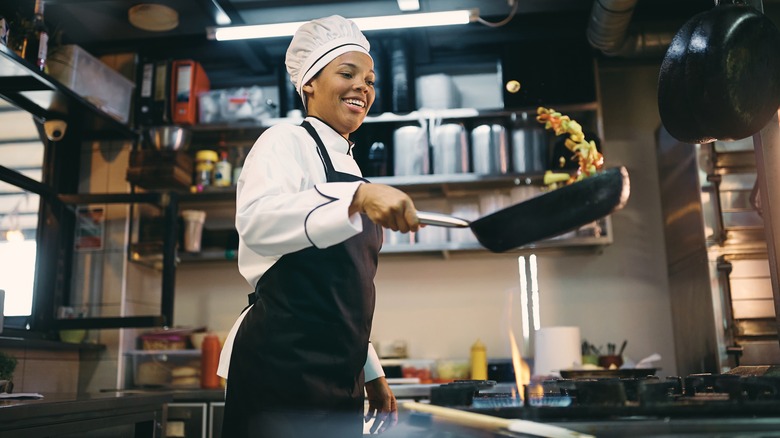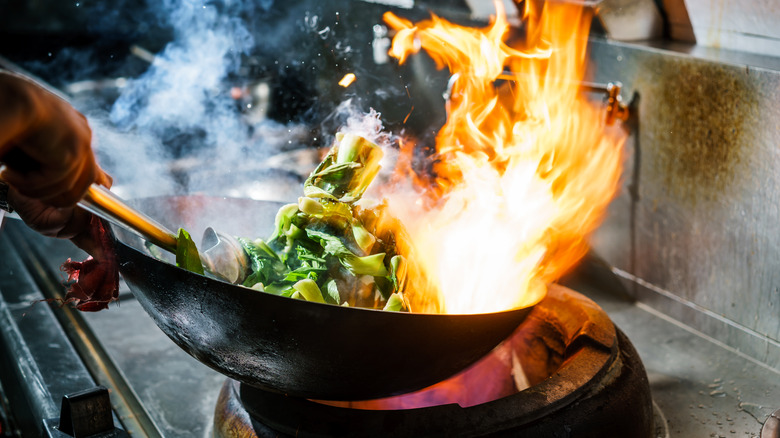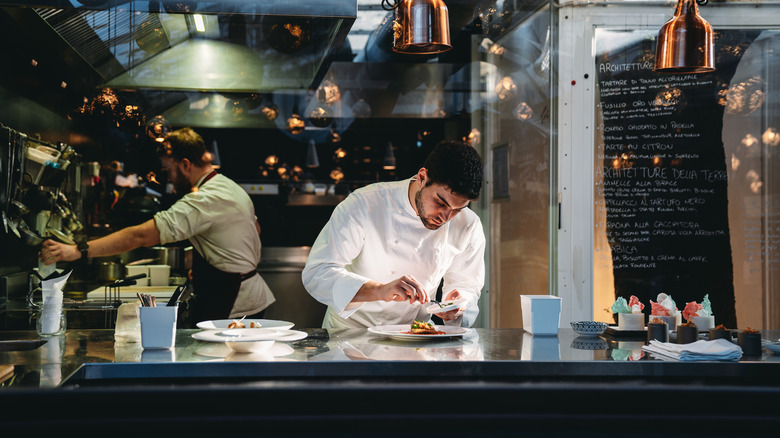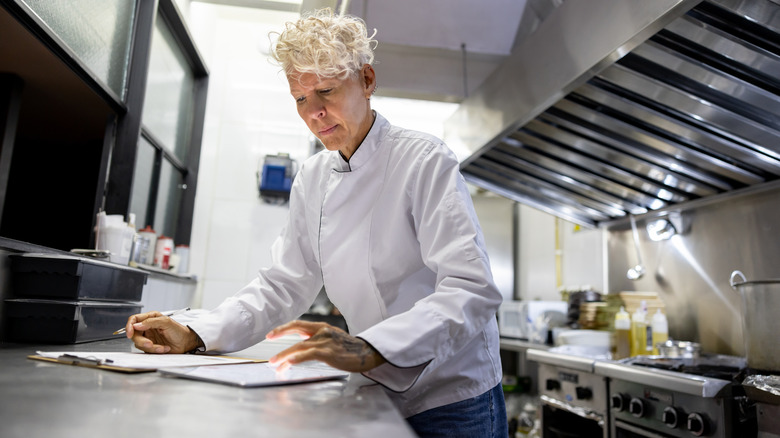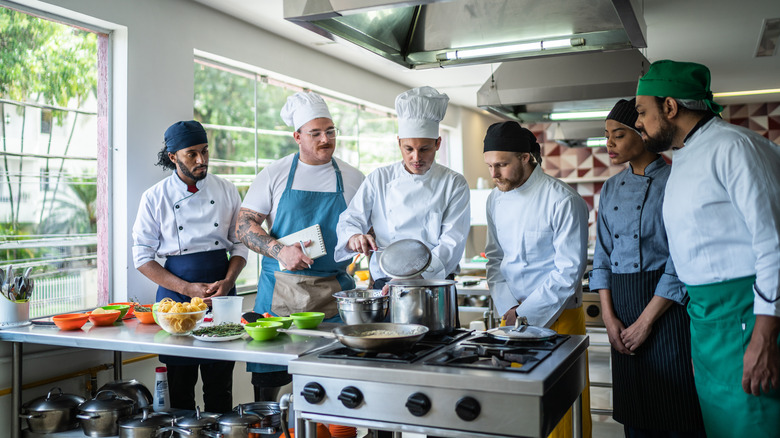What's The Difference Between A Chef And A Cook?
In the seminal 2007 Disney-Pixar film "Ratatouille," the protagonist Remy calls himself a "cook," but is referred to by others as a "chef." Is choosing to adopt or reject the title a humility thing? A subjective individual choice? Or is the cook-versus-chef role distinction simply a matter of definition? Ask anybody in the industry: The job titles are not interchangeable. It's about a lot more than semantics.
In the professional kitchen, the unspoken (or, depending on which establishment you're working in, explicitly spoken) pecking order is a very real thing. The kitchen hierarchy system was first implemented by legendary Chef Georges Auguste Escoffier during the 19th century to optimize kitchen efficiency. The power structure was inspired by the French Brigade System, and the "Second Course" section of Anthony Bourdain's magnum opus "Kitchen Confidential" explores the nuances of this industry organization at length. But, for such a militant division, how do the roles differ, if at all?
It can be tricky to differentiate the two at times because the tasks and duties of chefs and cooks frequently intersect and overlap. Oftentimes, they even both wear the same chef's whites. Still, the term "cook" certainly carries a less prestigious connotation than "chef," but is there any merit to that assumed subtext? Long story short, chefs are the captains of the ship, and cooks are the crewmen.
What is a cook?
"Cook" is itself an umbrella term for a myriad of different positions within the professional kitchen setting. There are line cooks (who are trusted with manning a certain station and preparing a specific type of food), porters (who handle ingredient prep and cleaning), commis (line cooks in training), and up-and-coming stagiaires (interns fresh out of culinary school). The title also differs based on the establishment. Casual eateries and chain restaurants are typically staffed by cooks, while fine dining establishments tend to have a team of both cooks and chefs.
Whether they're a line cook, prep cook, or short order cook, a master cook is a skilled tradesperson with an area of specialized expertise. The role of the cook is hands-on work, all about execution — building and plating beautiful dishes. They might prepare large batches of a certain dish or churn out mass quantities of the same meal for catering an event, following someone else's recipe. (By contrast, chefs can make up their own recipes, often on the fly.) Beyond handling food, cooks might also do the grocery shopping, perform custodial tasks, or interact with servers and sometimes bussers on the floor.
What is a chef?
Chefs are culinary specialists who know what to do without having to receive instructions and are comfortable (and may even thrive) in the intense, fast-moving professional kitchen environment. They're good at problem-solving under high pressure, can jump into any position when needed, are capable of teaching new hires any role, and probably have the menu memorized, too, even if the whole thing just changed last week.
Like cooks, the "chef" title also refers to an array of different positions: executive chef (the top of the pyramid who does it all, plus administrative work), chef de cuisine (the head chef who runs the kitchen from day to day), sous chef (under the chef de cuisine, the "deputy" of the kitchen who keeps it all running smoothly on the floor), and chef de partie (chefs who master a particular station). These chefs can be specialized sauciers (sauce), patissiers (desserts), poissonier (fish), rotisseur (meats), and more.
Chefs also oversee products to ensure that cooks are maintaining consistency between dishes. They have developed palates that took time, experience, and training to hone. But, perhaps most importantly of all, chefs are the artists and visionaries behind the food, juggling industry insights and connections. The concepts they create largely determine the restaurant's reputation and image.
Chefs have a larger leadership role
The primary factor that separates a chef from a cook is the chef's leadership role. The Culinary Lab Cooking School offers a straightforward, pedagogical definition: "[A] chef is an individual who is trained to understand flavors, cooking techniques, create recipes from scratch with fresh ingredients, and have a high level of responsibility within a kitchen. A cook is an individual who follows established recipes to prepare food." In other words, the cook knows the "what," and the chef knows the "why."
Brother Marcellus Luck IV (James Beard-nominated chef, restaurateur, "Top Chef" contestant, and winner of "Beat Bobby Flay") made an Instagram post supporting this distinction. "It's not about how many TV shows you've been on, how many restaurants you own, it doesn't matter how many Michelin stars you have or have worked in," Luck explains. "I call myself a cook, first and foremost, because cooks make food, and chefs make cooks, and I think mentorship is the first part of that."
Cooks expertly execute the dishes — but those dishes are imagined by chefs, who also prepare the courses, plan the menus, order ingredients, delegate tasks to the kitchen staff, and never stop looking for what's next. A major part of the chef's job is keeping up with industry trends and staying at the front of the action, which happens outside of the kitchen. Chefs may be in charge of cooks, but they're also in charge of the future of the restaurant.
Chefs have a wider variety of non-cooking responsibilities
Another key aspect that separates cooks from chefs is the scope of their responsibilities. After a long, hard day's work, cooks can clock out and step away from their shift until it's time to clock back in again. Chefs, on the other hand, are never truly off the clock, constantly brainstorming menu innovations, mentally organizing whether they'll need to call the fishmonger tomorrow, or deciding whether there are enough shallots in the walk-in to get through brunch this weekend. Administrative tasks like scheduling the cooks, assembling the shopping lists, handling equipment maintenance, and doing payroll also often fall to chefs.
All roles are essential to a successful, first-rate professional kitchen, but the title of "chef" comes with more leadership, variety, and creative freedom. Still, these benefits also translate to long working hours (50 to 70 hours a week isn't uncommon) and immense pressure to ensure that the restaurant keeps pace in the rat race of the wickedly competitive restaurant world, not to mention its infamously high employee turnover rate. There's a reason why the title "chef" carries such weight in the industry, and why it must be earned.
Chefs have more experience and training
Chefs typically have a degree in culinary education, while cooks might not have any formal training at all. In most cases, successful chefs reach their elite status with a combination of education and years of practical experience. Subsequently, chefs are also typically paid higher wages than cooks, whose entry to the kitchen is more flexible. It's also worth noting that there are aspects of being a good chef that cannot be taught in a classroom, and formal education isn't always necessarily the key separating factor between cooks and chefs.
Certain attitudes and personality traits like being tough, vigilant, organized, an independent worker with a team-player attitude, and a natural leader are indispensable to command the respect of the kitchen staff and make it well-deserved. A person can get a degree and still not have what it takes to be an executive chef (and that's okay). Still, navigating the kitchen with an internalized Rolodex of culinary information is crucial for running a restaurant like a well-oiled machine, and culinary school is a good place to learn it.
At the end of the day, most, if not all, chefs start as cooks. As Auguste Escoffier School of Culinary Arts Chef Instructor Jesper Jonsson advises anyone looking to climb, "We always say in this profession that you need to grow into the position that you aspire to have. So, if you want to become a sous chef, as a lead line cook, you need to begin doing sous chef jobs already."

